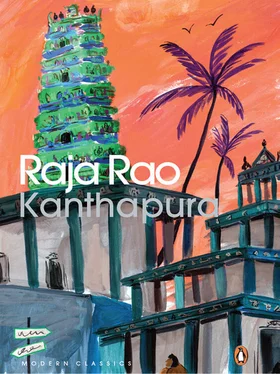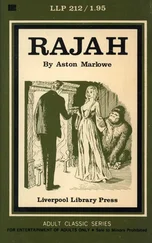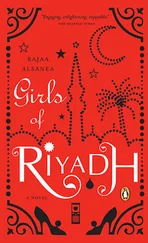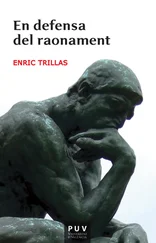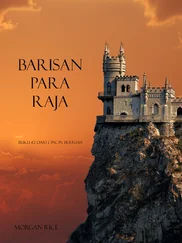Raja Rao - Kanthapura
Здесь есть возможность читать онлайн «Raja Rao - Kanthapura» весь текст электронной книги совершенно бесплатно (целиком полную версию без сокращений). В некоторых случаях можно слушать аудио, скачать через торрент в формате fb2 и присутствует краткое содержание. Год выпуска: 2014, Издательство: Penguin, Жанр: Классическая проза, на английском языке. Описание произведения, (предисловие) а так же отзывы посетителей доступны на портале библиотеки ЛибКат.
- Название:Kanthapura
- Автор:
- Издательство:Penguin
- Жанр:
- Год:2014
- ISBN:нет данных
- Рейтинг книги:3 / 5. Голосов: 1
-
Избранное:Добавить в избранное
- Отзывы:
-
Ваша оценка:
- 60
- 1
- 2
- 3
- 4
- 5
Kanthapura: краткое содержание, описание и аннотация
Предлагаем к чтению аннотацию, описание, краткое содержание или предисловие (зависит от того, что написал сам автор книги «Kanthapura»). Если вы не нашли необходимую информацию о книге — напишите в комментариях, мы постараемся отыскать её.
Kanthapura — читать онлайн бесплатно полную книгу (весь текст) целиком
Ниже представлен текст книги, разбитый по страницам. Система сохранения места последней прочитанной страницы, позволяет с удобством читать онлайн бесплатно книгу «Kanthapura», без необходимости каждый раз заново искать на чём Вы остановились. Поставьте закладку, и сможете в любой момент перейти на страницу, на которой закончили чтение.
Интервал:
Закладка:
‘Monsters, monsters,’ Rachanna’s wife cries out. And the Volunteer replies, ‘Monsters, monsters, yes, they may be, but we are out to convert them, the Mahatma says we should convert them, and we shall convert them; our hearts shall convert them. Our will and our love will convert them. And now let us be silent for a while, and in prayer send out our love that no hatred may live within our breasts. And, brothers and sisters, the battle, we will win. ’
And we all closed our eyes and said our prayers, but our eyes would quiver, and we saw cars go up the Bebbur mound and the bel field and the tank field and the big field, filled with these Pariah-looking coolies, and soldiers were at our doors and policemen in our sanctums, and vessels lay broken on the streets, pickle pots and gods and winnowing pales. And we say, ‘No, no — this will not do, this will not do,’ and Ratna says angrily, ‘Then you are not for the Mahatma!’ and we say, ‘We are, we are! — but we have only a loincloth wide of land and that is to be sold away, and who will give us a morsel to eat — who?’ and Ratna says, ‘Oh, don’t you be frightened — the Congress will look after it. Why, the Congress is ours, and much money is there in the Congress, and many a man has sent sacks and sacks of rice, and there are camps in Seethapur and camps in Subbapur, and camps, too, across the Mysore border in Shikaripur and Somapur and Puttapur. ’ But we said, ‘That is not enough, Ratna, and we are not cattle to leave our homes and our fires and the sacred banks of the Himavathy.’
But Ratna was already away and she was saying something to the boys inside, and we all went back home to light our fires and to put something into our stomachs; but the bath fire would not take and the sanctum clothes were not dry, and when we went to the backyard we could see the cars still shining like Brahma’s gates on the Bebbur mound, and the harvest simmering with the north-east wind that came from the Himavathy bend, and rising up the Kenchamma grove and the Bear’s hill went shaking the trees of the Skeffington Coffee Estate, and we felt we could tear our saris to pieces and slice our heads into a million morsels and offer them up to some ten-headed ogre. Of what use all this Satyanarayana Puja— and all these Moorthy’s prayers — and that widowed Ratna’s commands? Prayers never paid revenue dues. Nor would the rice creep back to the granaries. Nor fire consume Bhatta’s promissory notes. Mad we were, daughters, mad to follow Moorthy. When did Kenchamma ever refuse our three morsels of rice — or the Himavathy the ten handfuls of water?. But some strange fever rushed up from the feet, it rushed up and with it our hair stood on end and our ears grew hot and something powerful shook us from head to foot, like Shamoo when the goddess had taken hold of him; and on that beating, bursting day, with the palms and the champaks and the lantana and the silent well about us, such a terror took hold of us, that we put the water jugs on our hips, and we rushed back home, trembling and gasping with the anger of the gods. Moorthy forgive us! Mahatma forgive us! Kenchamma forgive us! We shall go. Oh, we shall go to the end of the pilgrimage like the two hundred and fifty thousand women of Bombay. We will go like them, we will go.!
Men will come from the city, after all, to protect us! We will go.!
We drew two carts across Sami’s courtyard so that nobody could see the procession we were preparing, and flowers were brought, and sandal and banana trunks, and Ratna went and brought a picture of Satyanarayana and stuck it in the middle, and somebody put a Gandhi at his feet and set a flower upon it, and even sajji was being made in the kitchen, and butter and banana and syrup, and when camphor trays and kumkum trays were decorated and the wicks sharpened, Ratna says somebody will blow the conch from the promontory at dusk-fall, and the men who would be lying hidden in the jungle and by the river, and village men and city men would rush from this side and that and, with the Satyanarayana procession in front of us, we would go through the Brahmin street and the Pariah street to the village gate and across the lanes and the pastures and the canal to do field-Satyagraha.
And now and again, when we heard footsteps, we all rushed back into the byre for fear we should be seen, and then Seethamma, who was plucking flowers in the backyard, came and said, ‘Sisters, sisters, do you know more buses have come and more men have come from the city for the auctions?’ and we all said, ‘Only a Pariah looks at the teeth of dead cows. What is lost is lost, and we shall never again look upon our fields and harvests.’ And then someone comes running in and says, ‘Why, there are women there, too,’ and we could not stop our fears and we rushed to see who these bitches could be, and Timmamma, who had keen eyes, says, ‘Why, they are our women; cannot you see? Agent Nanjundia’s wife Subbamma is there, and there is Kamalamma’s Kanchi sari too,’ and we all say, ‘Well, one soul lost for us.’ Then Timmamma says, ‘Why, there is Venkatalakshamma too — Venkatalakshamma who fed Moorthy. Why, sister, a woman who could have starved her stepchildren so, could never be a Gandhi woman,’ and Seethamma says, ‘And there is Priest Rangappa’s wife Lakshamma too, I think.’—’To buy off for Bhatta, surely,’ cried Ratna. And we sought to make out who this woman was and who that woman was, but we could hardly see, for the evening was drawing near. And then suddenly there arose the clamour of the Pariah women and the Sudra women, for a white man stood there on one of those trucks, and he was turning to this side and saying something, and turning to that side and saying something, and hands were thrust up, and people pressed against one another, and voices shot across the valley as clear and near as though they came from the other side of the Brahmin quarter, and the Pariah women shrieked and shrieked, they beat their mouths and shrieked, and the children joined them, and our hearts began to give way, and Ratna said, ‘Now no more of this — nobody wants to see a drowning person,’ and we all rushed back to the Satyanarayana procession-throne.
But the clamour still rises from beneath the promontory and we can hear Timmi, Timmayya’s Timmi, cry out, ‘Oh! The bel field! May your house be destroyed — may your wife die childless — I’ll sleep with your mother!’ And the lamentations begin and lathis strike and the shriekings die down; and then we turn back to see suddenly that there is a city man at the byre door, and Ratna says, ‘Why, that’s Sankaru,’ and we say, ‘Why, the Sankaru, the Sankaru,’ and we feel a holy presence among us, and behind him are more men, more boys from the city, and he walks silently towards us and sees our throne ready and says, ‘That is good,’ and Ratna is trembling with joy and she says, ‘Why, when did you come?’ and he says, ‘Never mind. Is everything ready, for soon must the conch be blown,’ and we all say, ‘Who will blow it? Who?’
And with the coming of the evening, we hear the last shouts from the Bebbur mound, and dogs bark and bats flap about, and then there is such a cry again from the Sudra lines and the Pariah lines that Ratna rushes to the backyard, and we all rush behind her, and from beneath the giant mango by the well we see the Pariah-looking men of the Bebbur mound go down crowd by crowd, sickle and scythe in hand, crowd by crowd to the big field and the Bebbur field and Lingayya’s field and Madanna’s field and Rangamma’s field and Satanna’s triangular field, and then the cars start, and one by one the cars go down and sail away beyond the Kenchamma hill, and we say, ‘It’s lost, it’s lost, but they are not going to reap tonight, and it shall be ours one night more.’ But from inside the trucks they take out big, strong gaslights of the city, and like a veritable marriage procession they bring the lights down — coolie behind coolie brings them down. Dusk falls and night comes and all our fields lie glimmering under the pale yellow lights of the city. Then Sankaru rushes in and cries out, ‘Now, Ratna, blow the conch!’
Читать дальшеИнтервал:
Закладка:
Похожие книги на «Kanthapura»
Представляем Вашему вниманию похожие книги на «Kanthapura» списком для выбора. Мы отобрали схожую по названию и смыслу литературу в надежде предоставить читателям больше вариантов отыскать новые, интересные, ещё непрочитанные произведения.
Обсуждение, отзывы о книге «Kanthapura» и просто собственные мнения читателей. Оставьте ваши комментарии, напишите, что Вы думаете о произведении, его смысле или главных героях. Укажите что конкретно понравилось, а что нет, и почему Вы так считаете.
